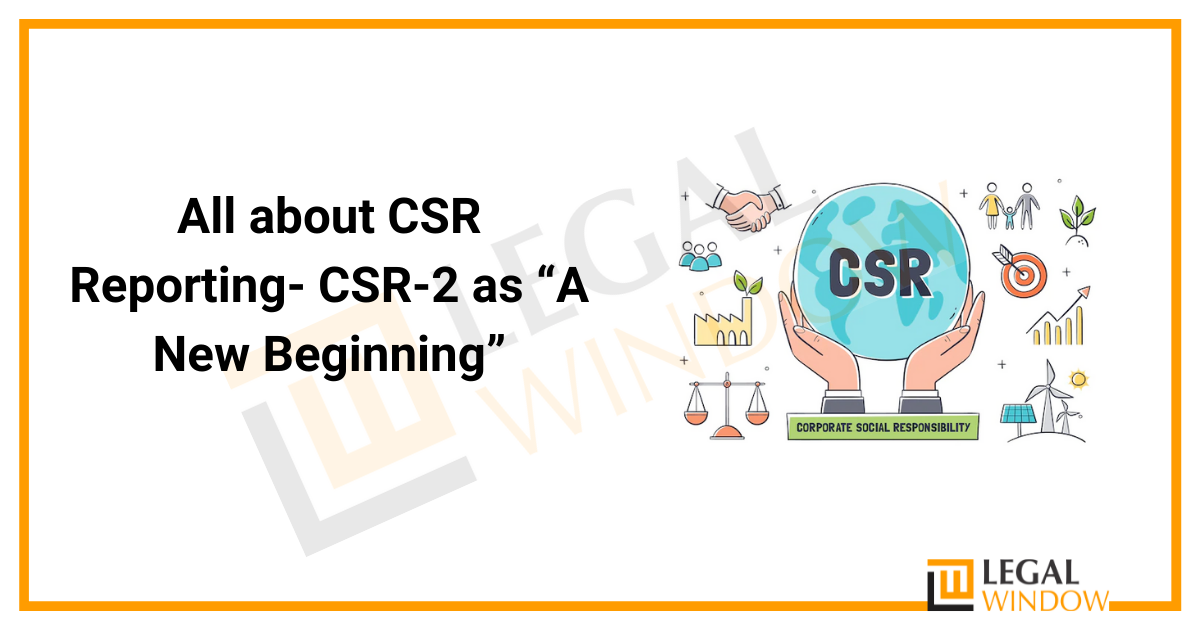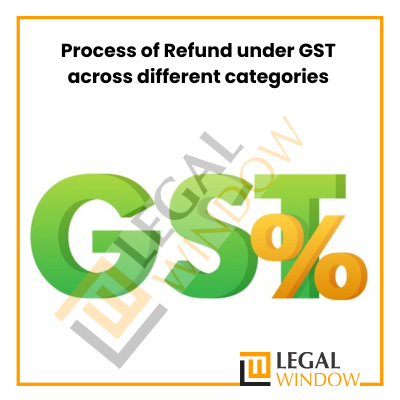
We live in a dynamic world that is becoming complex. Environmental, social, cultural, and economic challenges on a global scale have now become a part of our daily lives. Profit maximisation is no longer the main business performance metric for corporations, but acting as responsible corporate citizens who have a responsibility to society. Companies in India now have a larger duty to establish a defined CSR framework, as to the notion of Corporate Social Responsibility (CSR), which was established by the Companies Act of 2013. The Ministry of Corporate Affairs (MCA) has now mandated that all such companies submit a comprehensive report on their CSR activities in Form CSR-2, which includes details on CSR spending, CSR projects, the creation of capital assets through CSR spend, the CSR Committee, and Polices, etc. So, throughout this blog below, Legal Window will guide you about CSR Reporting, its recent amendment and Relevance.
| Table of Contents |
What do you mean by CSR- Corporate Social Responsibility?
The concept of corporate social responsibility is that a company has a duty to the society and environment in which it exists. A Corporate Social Responsibility (CSR) report is a document that corporations use to explain their CSR activities and their impact on the environment and community to both internal and external audiences. The CRS efforts of an organisation can be divided into four categories: environmental, ethical, charitable, and economic.
“Corporate Social Responsibility” covers, but is not limited to, the following under CSR Rules:
- Projects or programmes that are related to the activities listed in Schedule VII of the Act.
- Projects or programmes relating to activities undertaken by the Board of Directors of a company in order to ensure the recommendation of the CSR Committee of the Board in accordance with the Company’s declared CSR Policy, subject to the condition that such policy cover subjects specified in Schedule VII of the Act.
The Importance of Corporate Social Responsibility for Business
- External and internal stakeholders can learn about an organization’s mission, activities, and outcomes through CSR reports. Customers, the local community, and society at large are among those who are affected, in addition to workers, decision-makers, and shareholders.
- CSR enhances a company’s public image by publicising its efforts to make the world a better place, increasing the likelihood of consumers favouring them.
- It generates more media attention since it casts a favourable light on the organisation.
- CSR increases the value of a company’s brand by forging a socially strong relationship with its customers.
- When firms are involved in any form of community, CSR helps them stand out from the competitors.
Applicability for CSR Reporting
The minimum requirement for applicability according to Companies Act, 2013 is set under section 135 of the Act.
CSR in the Workplace:
- The company’s net worth must be at least Rs 500 crore; or
- Company’s annual turnover is at least Rs 1000 crore; or
- The company’s net profit must be at least Rs 5 crore.
During the immediate previous financial year, should devote 2% of its average net profit earned over the previous three financial years to CSR initiatives.
Recent Notification on CSR by MCA
- The Companies (Accounts) Amendment Rules, 2022, have been amended by the Ministry of Corporate Affairs on February 11, 2022. According to the modified rules, every firm covered by u/s 135 must submit an E-Form CSR-2 report on corporate social responsibility to the Registrar for the prior financial year (2020-2021) and subsequent years. Previously, no form was necessary to submit a CSR report.
- The government intends to acquire a better understanding of how corporations use their CSR money and the types of activities they arrange through the new reporting format. It is also envisaged that openness would be introduced into the CSR compliance domain.
- Companies must file Form CSR-2 by March 31, 2022, for the fiscal year 2020-21.
- “For FY 2021-22 and onwards, the Form CSR-2 shall be filed as an addendum to Form AOC-4 or AOC-4 XBRL or AOC-4 NBFC (Ind AS), as the case may be.
Aim of MCA behind CSR-2 “A New Beginning”
CSR (corporate social responsibility) is a self-regulatory business model that enables a firm to be socially responsible—to itself, its stakeholders, and the general public.
- CSR-2 could be valuable for data mining and analysis by the MCA’s CSR section in order to implement improved policies.
- This reporting requirement would undoubtedly improve transparency and disclosure of CSR initiatives.
- The information gathered through these forms could be useful in order to detect CSR fraud and design effective CSR policies.
- However, the revisions to CSR reporting, on the other hand, raise the regulatory burden on businesses and may not accord with the government’s objective of encouraging ease of doing business in India.
- CSR-2’s broad breadth will also increase the amount of data available to the MCA, which might be used to inform future CSR legislation.
Legal Provisions for Non- Filing of CSR
If a corporation fails to comply with the laws relating to CSR spending, transferring, and using the unspent funds, it will be fined a minimum of Rs 50,000, with a maximum fine of Rs 25 lakh. Furthermore, all corporate officers who are responsible for the default may face comparable sanctions. The police could face a sentence of up to three years in prison, a fine ranging from 50,000 to 5, 00,000, or both.
Conclusion
On contrast with the above blog, we can say that MCA’s move is surely effective nonetheless; MCA should make every attempt to obtain as much information as possible with the least amount of increased compliance, as most of the disclosures requested in Form CSR-2 are previously provided by corporations in their Directors Report. For any query feel free to contact our expertise team of Legal Window.
Neelansh Gupta is a dedicated Lawyer and professional having flair for reading & writing to keep himself updated with the latest economical developments. In a short span of 2 years as a professional he has worked on projects related to Drafting, IPR & Corporate laws which have given him diversity in work and a chance to blend his subject knowledge with its real time implementation, thus enhancing his skills.
Categories
- Agreement Drafting (23)
- Annual Compliance (11)
- Change in Business (36)
- Company Law (147)
- Compliance (88)
- Digital Banking (3)
- Drug License (3)
- FEMA (17)
- Finance Company (42)
- Foreign Taxation (6)
- FSSAI License/Registration (14)
- GST (116)
- Hallmark Registration (1)
- Income Tax (199)
- Latest News (34)
- Miscellaneous (164)
- NBFC Registration (8)
- NGO (14)
- SEBI Registration (6)
- Section 8 Company (7)
- Start and manage a business (20)
- Startup/ Registration (126)
- Trademark Registration/IPR (40)
Recent Posts
About us
LegalWindow.in is a professional technology driven platform of multidisciplined experts like CA/CS/Lawyers spanning with an aim to provide concrete solution to individuals, start-ups and other business organisation by maximising their growth at an affordable cost.








